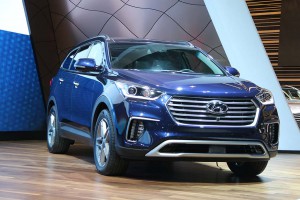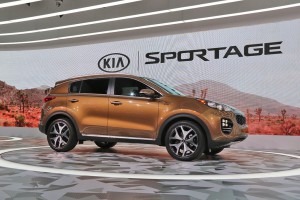Hyundai Motor and affiliate Kia Motors plan to launch three low-cost sport utility vehicles in China next year, according to reports from Asia, trying to take advantage of the country’s current thirst for SUVs and MPVs.
Like General Motors and Volkswagen, China has become the largest market for Korean car companies. Making cheaper models specifically designed for the Chinese market will represent a shift in strategy for the South Korean, who have generally relied on older models to satisfy the demands of consumers in China.
However, the Chinese market is evolving rapidly and both American and European carmakers have brought new technology to vehicles to separate themselves from their competition. China’s own carmakers have become increasingly sophisticated meaning that their Korean counterparts need to follow that trend.
The competition, coupled with slower growth, have put pressure on the China operations of Hyundai and Kia, according to Reuters. The South Korean share of the Chinese market slid to a seven-year low of 8.9% last year, down from 10.4% in 2014, according to company data. The drop in annual sales was the biggest among the top 10 automakers in China, data from IHS Automotive showed.
At the same time, sales of SUV and MPVs have boomed in China.
(Hyundai Elantra goes Eco. For more, Click Here.)
Matt Tsien, president of China, said during a recent visit to Detroit that GM was pressing ahead with plans to add more SUVs to the portfolio of vehicles that it sells in China. GM also has been actively courting less affluent Chinese buyers by offering less expensive vehicles through new brands such as Baojun.
Hyundai plans to build a compact, no-frills SUV at its planned factory in Changzhou starting in November 2017, and a subcompact SUV at its new Chongqing factory in 2018, Reuters reported Kia will follow with its own subcompact, entry-level SUV in 2018, another two people said, with one adding that Kia also plans to produce its mid-sized SUV in China next year.
“After missing out on a segment where Chinese have a head start, Hyundai is rushing to build small SUVs,” said one of the individuals, declining to be named as the plans told Reuters.
Hyundai and Kia are also planning to use more Chinese suppliers. The two automakers, which have a joint research and development center in the Chinese city of Yantai, are also stepping up local engineering, he said.
Hyundai said it is taking steps to defend its position against Chinese rivals.
The group is “internally examining from various sides to develop differentiated SUVs that give customers a more practical value by continuing in our cost-cutting efforts,” it said in an emailed response a query from Reuters. Hyundai also said it is “developing parts and specifications” that are best suited to local needs as part of its efforts to be price competitive.
(Automakers taking fire for bending the truth and outright lying. Click Here for the story.)
The shifting strategy in China also could lead to changes in the company’s strategy in the U.S.
Hyundai Motor America has been waiting approval for the Santa Cruz, which earned plaudits last year on the auto show circuit in the U.S. The Santa Cruz could potentially compete with vehicles such as Toyota Tacoma, GMC Canyon, Nissan Frontier and Honda Ridgeline
Outside analysts, however, have speculated that Hyundai is reluctant to enter the U.S. truck market because the company’s South Korean executive believe trucks are basically commercial vehicles and would diminish the company’s effort to build up the reputation of its passenger cars. Instead the company has embarked on an effort to create a new luxury brand, Genesis, to appeal to American customers.
Some industry experts are warning that introducing low-end SUVs could undermine the Korean automakers’ quality and brand image.
“Going down-market into low-cost SUVs may actually damage the brand in the long term,” James Chao, Asia-Pacific managing director at IHS Automotive, told Reuters
“Whereas Chinese-brand car and SUV offerings were once looked upon with disdain or rejected outright, they’re now increasingly accepted,” said Michael Dunne, president of Hong Kong-based consultancy Dunne Automotive, citing “a clear sea-change” in buyer perceptions about Chinese brands.
(Safety, not profits, come first, says Transpo Sec Foxx, as Takata recall expands. Click Here for the story.)
The stakes are high for Hyundai as its two planned Chinese plants will boost its combined production capacity with Kia by nearly 30 percent to 2.7 million vehicles a year in 2018.


